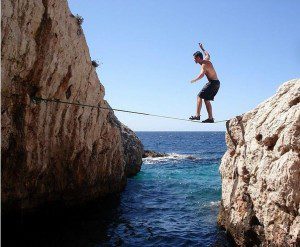By Fox Chandler
Guest Writer for Wake Up World
Tucked away in the brain’s medial temporal lobe is an almond-shaped group of neurons that play a key role in processing our very human emotions. Whilst there is considerable debate amongst the scientific community regarding how the amygdala processes information it is generally agreed that it is involved, amongst other things, in managing those emotions associated with fear and panic; our so-called flight or fight mechanism.
It is present in all primates, be they chimpanzees or humans, and functions in the same way in those that show no fear to those that hop on a table at the sight of a mouse. In response to a frightening set of inputs; be it sight, sound, smell etc. we’re automatically ‘readied‘ for flight or fight – the startle process – and then in response to a secondary set of inputs we’re guided as to the most appropriate action. This secondary circuit involves our stored memory and is the reason why we shudder when confronted with something that may have been a cause of fear or panic in the past.
In today’s world we’re less likely to be frightened by oncoming carnivores as we are by the prospect of financial meltdown, emotional turmoil, poor health or just general unease over the state of ‘things’. Yet it is still the amygdala that shifts us into a state of readiness. (That this is a natural and valuable mechanism is of little import at 2am when sleep eludes us).
Anyone who has stepped out to the very edge of a precipice and looked down will be familiar with the feelings that a slack-rope walker feels. Be it 10 feet off the ground or a 1000 feet the feelings of fear are the same. So are there two types of people; those without fear and the rest of us? The answer is, though difficult to accept, No. Just as there are not “born motorcycle racers” or “born down-hill skiers” there are none born without fear. For to be so would require a malfunctioning amygdala and that would have major consequences that would prevent anyone from becoming a “born” anything.
So how then can one person scale a building without a safety net whilst another cannot face standing on a chair? It is a matter of trust. To overcome a fear doesn’t require us to be ‘fearless‘ it requires us to place our trust in that which will assist us to overcome the fear.
Trust is therefore an essential element in our journey towards self-realisation. We are all born with infinite potential and only through fear is this potential collapsed, over time, to leave us with diminished horizons. To be all we can be requires that we counter-balance our fears with a trust that will carry us through the challenges we will face. For some that trust is a self-belief built up over years of effort, practise and rehearsal. For others it maybe God (within or without a structured religious faith) or a Universal spirit or energy or a personally shaped faith structure. Where that trust is placed is not as important as the need for that trust to be real, to feel real and to be ‘realisable‘. To be realisable we must, when facing a fear, be able to ‘borrow’ against that trust to balance the fear. The fear will remain but it will not hold us back for we have deployed trust to manifest a positive outcome.
Over time our trust mechanism will be imprinted onto our stored memory and when our amygdala reacts to external stimuli it will search that memory, note our previous reactions and, where we have ‘trusted‘, it will turn down a notch its call to arms.
Self-realisation will present many challenges; a working trust mechanism will provide the sense of balance required to overcome them all.
About the author:
Fox is the pen name of Steve Chandler, chosen for the ability of this iconic animal to adapt and thrive wherever it makes its home. UK-based Fox left London in 2000 to pursue a more balanced life and explore the path to self-realisation. Currently living in Manchester his path has involved many twists and turns, many false starts and a few blind alleys. But his journey continues and he writes partly out of self-expression but most importantly to explore the nature and meaning of awareness.
His advice for anyone seeking to fully attune to the call of awareness is to get out into the countryside and just enjoy the miracles that abound.
When not writing, cycling or working in his local community allotment Steve works as a marketing and communications consultant and is currently working towards a BSc in Natural Sciences.

If you've ever found value in our articles, we'd greatly appreciate your support by purchasing Mindful Meditation Techniques for Kids - A Practical Guide for Adults to Empower Kids with the Gift of Inner Peace and Resilience for Life.
In the spirit of mindfulness, we encourage you to choose the paperback version. Delve into its pages away from screen glare and notifications, allowing yourself to fully immerse in the transformative practices within. The physical book enriches the learning process and serves as a tangible commitment to mindfulness, easily shared among family and friends.
Over the past few years, Wake Up World has faced significant online censorship, impacting our financial ability to stay online. Instead of soliciting donations, we're exploring win-win solutions with our readers to remain financially viable. Moving into book publishing, we hope to secure ongoing funds to continue our mission. With over 8,500 articles published in the past 13 years, we are committed to keeping our content free and accessible to everyone, without resorting to a paywall.







